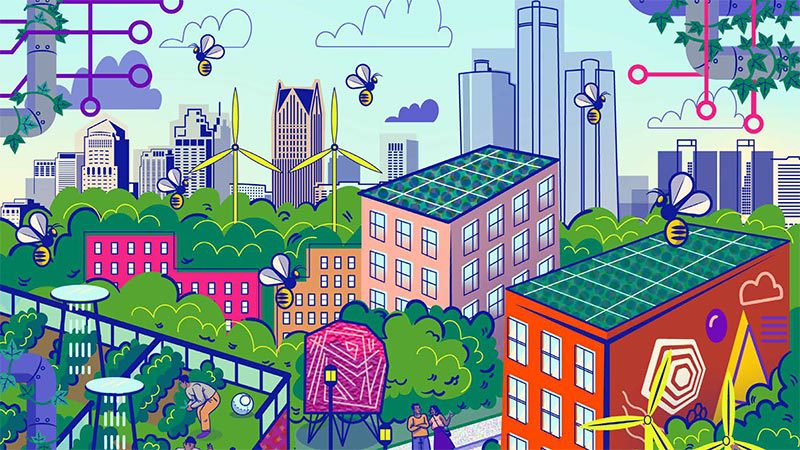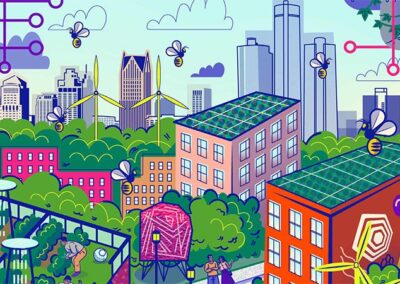Exhibited in Platform Austria exhibit at Venice Architecture Biennial 2021, published in Platform Urbanism and Its Discontents
“How will we live together? Hashim Sarkis has framed the Biennale Architettura 2021 around this primordial question, inflecting it through five scales and conceptual frames: as diverse beings, as new households, as emerging communities, across borders, and as one planet. Platform Austria considers the ways that platform urbanisms answer that question … and how we might occupy, learn from, modify, proliferate, destroy, or replace existing urban platforms to promote our many conceptions of the public good….
This is the work my colleagues and I are digging into at the University of Michigan’s Taubman College of Architecture and Urban Planning. We are studying Lyft and Turo and Ford, Airbnb and Sonder, Zillow and Yelp, Instagram and Grindr, WeWork and Zoku, Sidewalk and Amazon and Katerra, Paperspace and Monograph, Facebook and Google. We are learning from the Boston Urban Mechanics, Oakland Civic Design Lab, Allied Media Projects, Design Vanguard, Bloomberg Cities, Tech Reset Canada, our own Centre for Ethics, Society, and Computing, and many other sources. We are analysing algorithmic bias, helping cities interpret their data, deploying sensors to understand public health, developing space-as-a-service products, making games that teach players common-ing. We are building our curriculum and preparing to welcome students into the study and practice of urban technology.”
Full Text
By Jonathan Massey, Dean
How will we live together? Through the Platform Austria project, the other contributors to this volume and I are considering the ways that platform urbanisms answer that question. We are exploring the ways we might occupy, learn from, modify, proliferate, destroy, or replace existing urban platforms to promote our conceptions of the public good.
One path into this topic is through the prompt that Peter Mörtenböck and Helge Mooshammer issued at the start of the project: “We Like.” Drawn from social media practices, this framing invites us to apply the methods of tech platforms recursively to their analysis, as well as to generate insight through appreciation.
Speaking for myself, I like to hail a ride, share a ride, grab an on-demand bike or scooter, understand routing options and times across multiple modalities. I like to rent an apartment or bedroom when I travel so that I can cook, or stay where there aren’t many hotels, or open the window, or share a place with a group of friends. I like to rent out my own place when I’m away. I like being able to instantly identify, evaluate, and select from among nearby restaurants, bars, shops, and businesses. I like connecting with friends and strangers on social media apps. I like being able to consume as much or as little workspace as I like on flexible terms, with a range of amenities and supports at hand, and to make use of a portfolio of spaces ranging from isolated to sociable. I like better building materials and systems, such as mass timber framing, reconfigurable wall panels, digital electricity, and district-scale utility systems. I like municipal services informed by geodata and crowdsourcing. I like learning on my schedule rather than someone else’s. I like the efficiencies and process improvements that big data analytics can generate. I like the potential to automate repetitive tasks and iterative workflows in architectural and urban design. I like outcome-based analytics and decision-making.
What else do I like? Universal healthcare. Workplace safety. Worker protections. Living wages, maybe even guaranteed basic income. Affordable housing. Public transit. Food security. Accessible education. Ethical supply chains. Inclusive forums. Appropriate technology. IRL community. Privacy, especially with respect to state power. Consent. Sharing in the value I create. Equity. Justice.
How to reconcile these desires, goals, ethical claims? What about the many others that I have forgotten today but will remember in the morning? What about the needs and priorities of my neighbors, fellow citizens, and fellow non-citizens? Animal species and other nonhuman actors? I don’t always know how to discern, evaluate, and balance competing priorities, or to factor fully the parochialism and privilege that shape my judgment. But I don’t think the status quo is sufficient or sustainable. I’m excited by the prospect of change to our buildings and cities, and to the ways of life that they support. I recognize the uneven benefit and negative impacts of data- and technology-based methods for seeing, shaping, and inhabiting cities. I’m encouraged by the policy responses that are regulating the tech sector, the gig economy, and other data capitalist ventures at multiple scales. I’m inspired by resurgent unions, emergent platform cooperatives, and other forms of worker ownership.
I come to this conversation as a scholar and academic leader trained in architecture and its history. My research has shown how architecture mediates power by shaping civil society, culture, and consumption. During a decade of involvement in the Aggregate Architectural History Collaborative I worked with colleagues to understand how change happens, who authors design, how architecture participates in modernization—how architecture governs. In parallel I took up academic leadership, first at Syracuse University, then at California College of the Arts, and now as dean of the University of Michigan’s Taubman College of Architecture and Urban Planning. In these roles, I focus on the ways we generate knowledge through research and creative practice and on the methods of teaching and learning that equip students to shape the future.
Many of my former students have entered or engaged the tech sector. They are designing co-working facilities or user interfaces; developing space-as-a-service products, workflow software, computer processing platforms; writing policy and engaging in advocacy to expand access for or limit harm to underserved constituencies. Architectural education gave them powerful abilities such as spatial analysis and imagination, logistical intelligence, humanistic vision, representational virtuosity, and multidisciplinary synthetic capacity. But it didn’t always prepare them to design the lifecycle of a building, product, or service; to use data and algorithms in critical and generative ways; to navigate markets and financial and regulatory processes; or to design services and strategies. Intervening in contemporary urbanization and the platforms shaping our lives requires a set of knowledges, mindsets, and skills that overlap with but also differ from those bundled into an accredited architecture degree.
In order to renew the agency of architecture–the charge issued by chief curator Hashim Sarkis through the Venice Architecture Biennale, and a permanent priority for any forward-looking school–we must remix the discipline’s content, capability, and culture with those of other fields that are increasingly impactful in forming the built environment. This entails engaging proactively with emerging forms of knowledge, tools, technologies, and modes of organization. It requires setting aside some of the topics and skills inherited from prior eras of education and practice. It calls us to carry forward some of our ethical and political commitments while reassessing others in light of new forms of social and economic organization and emergent justice claims.
This is what my colleagues and I are doing at Taubman College. Faculty in architecture, urban planning, and urban design are collaborating with colleagues in other fields and with partners from practice, industry, policy, advocacy, and activism to describe and shape the new field of urban technology. Recognizing that platform urbanism is rapidly reshaping cities and communities, we have developed a new degree aimed at equipping students to accelerate, resist, and modulate data-driven urban transformation. Launching in January 2022, our new Bachelor of Science in Urban Technology will give students the vision, knowledge, and skills to shape urban futures at the intersection of information technology with urbanism and design.
This four-year degree combines thinking and doing, critical reflection and generative praxis. Its courses incorporate a humanist framing of ethics, principles, histories, policies, and urban constituencies; a technical understanding of computation, networks, and data science; and a creative component centering on action through strategy design and service design. By mobilizing data- and technology-based strategies that improve outcomes for city dwellers, graduates will help businesses, governments, activists, and communities address key questions: How does technology help us see and understand cities afresh? How could it help us shape cities through new methods? How might it help us inhabit cities in more fulfilling ways? What policies will promote equitable access and outcomes in cities increasingly transformed by private enterprise?
Our Urban Technology curriculum responds to three patterns in what some term the fourth industrial revolution. First, technology companies are increasingly creating products and services that have spatial, regulatory, and experiential implications in cities. These organizations need a deeper understanding of cities so that they can better address the real needs of urban dwellers in both high- and low-resource contexts. Students who complete our degree will be able to apply their understanding of computation, networks, algorithms, and sensors to promote efficiency and equity, opportunity and inclusion.
Second, urban practices including planning, policymaking, and advocacy increasingly use technological tools such as GIS to understand cities and to regulate technology businesses, products, and services such as autonomous vehicles, delivery drones, face recognition, data privacy, and cybersecurity. These organizations need a deeper understanding of the functions, limits, impacts, and potentials of the technical systems in question.
Third, the disciplines driving platform urbanism, including business, engineering, and information, increasingly employ the collaborative, iterative, and multi-disciplinary methods of discovery and creation at the heart of design education and studio pedagogy. We aim to give the humanist and social scientific approaches of urban studies and planning greater voice in designing urban futures–and also to accelerate the movement beyond the human-centered design methodologies that have powered the rise of design thinking by integrating broader use of quantitative evidence, engaging more directly with technical systems, and centering equitable approaches to co-creation and participation.
Faculty teaching in our existing architecture, planning, and urban design degrees bring much of the expertise behind our curriculum, in many kinds of design as well as urban informatics, collaborative planning, networked urbanism, gaming, crowdsourced urbanism, algorithmic bias, and commoning. We also draw on the knowledge of colleagues from across the University of Michigan in areas such as data science, entrepreneurship, digital studies, and many other humanities fields. We are partnering with companies, policymakers, NGOs, and advocacy groups to connect their knowledge and priorities with our teaching and research.
Many of us are deeply skeptical of platform capitalism and the infrastructures, armatures, and interfaces through which it shapes cities, buildings, and communities. But we see the opportunity and need for research and teaching that center on the intersection of urbanism with technology. We like digging into the contradictions and complexities of the past, present, and future.
So as practitioners and scholars we are analyzing algorithmic bias, helping cities interpret their data, deploying sensors to understand public health, developing space-as-a-service products, making games that teach players commoning. As teachers, we are building our curriculum and preparing to welcome students into the study and practice of urban technology. We orient the many forms of knowledge and skills making up this degree toward enabling students to pursue a mission relating to the urban future. Whether they focus on transportation and mobility, housing, logistics, energy, public health, or another domain, our students will synthesize capacities in urbanism, technology, and design to help the many constituencies with a stake in urban futures live together in a myriad of ways.


